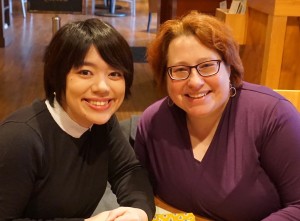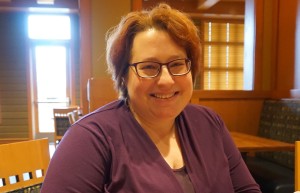This article is also available in: 日本語

After I started my research in Syracuse, I have become much more interested in education.
In Minnesota, I had an opportunity to interview an interesting person, Dr. Wendy Harbour who was a professor at Syracuse University, and now working for Association on Higher Education And Disability (AHEAD).
We have exchanged emails couple times to adjust schedule and send my question list before we actually met.
However, I was little confused when she showed up the lobby at hotel where we were planning to meet up because she started greeting to another lady who I didn’t know.
“Did you know I’m Deaf?” Wendy said to me with a big smile.
“OH! I didn’t know!” I replied. I was surprised in a good way.
“So, she is my interpreter.” Wendy continued.
For the first time, I experienced to talk with a deaf person through an interpreter.
Although my English is not perfect, the interpreter translated perfectly and we could communicate very well like we knew each other for ages.

Wendy started having difficulties at hearing when she was a high school student.
The high school she attended to was private and 100% of students went to college after graduation.
However, the school told her that “if you don’t want to go to college, it is okay.”
She was very surprised by the teacher’s sudden change of expectation of her due to her hard of hearing.
Despite of the words, she entered the college and fortunately her friends were very supportive.
Surprisingly, however, the college wouldn’t pay for interpreters which she needed to study in classroom.
It made her very upset and feel betrayed.
Because of the situation, she transferred to University of Minnesota which has incredibly great support for students with disabilities.
I realized some disability centers are good, but some are not.
It doesn’t matter if a college is good or not.
You could have a good college with good disability services.
But you also could have a good college with bad disability services.
That can make all differences to a student.
Wendy said.

During her college life, Wendy was involved with a deaf community and met people who were driving and had children which she almost gave up after she became hard of hearing.
Also she realized that disabled people sometimes felt like that the disability was a part of who they are and it is not a sad or tragic thing either.
She even went to get her doctorate at Harvard University and studied universal design, disability studies, higher education, and special education.
As everyone knows, Harvard University is the one of the best schools in the world.
Therefore, people said that Wendy could get job offers soon even if she only applied for 5 jobs before she left Harvard University.

However, eventually she applied for 65 jobs before she got the first offer from Syracuse University.
She applied not only for jobs at universities, but also for the ones at companies and federal government, everywhere.
Everyone at her class applied for 4 or 5 jobs and all got a job right away.
It was obviously discrimination because she was involved with the same things they were, and had all work experience too.
People just kept thinking how expensive I was because I would have to have an interpreter.
They didn’t see that it would be worth it.
I could bring other things even if I cost money or whatever.
They don’t think that way.
Wendy said.

As a professional of education, Wendy mentioned,
The problem is almost everybody in the US thinks that they are doing inclusive education.
But some schools consider inclusive education just related to differences of race, and send kids with disabilities into limited classrooms or separated schools, and they are proud how inclusive they are.
But actually that is is not inclusive education.
In the US, going to college and getting a degree is one of the most important things because it will open up doors to jobs.
But people with disabilities, we would face terrible discriminations when we try to get a job.
It is hard because I tell students that the college degree will help, but it can’t guarantee a job.
However, still, I don’t want them to give up pursuing their dreams because of disabilities.
There are many people who made great careers even with disabilities.
And those people changed the world.
I really hope more people with disabilities go to higher education and learn more and figure who they are.
I believe that the college students are usually the ones who were leading all the real revolution.
I would like to help create the next Ed Roberts or Judith Heumann or next revolutionary in disability too.
